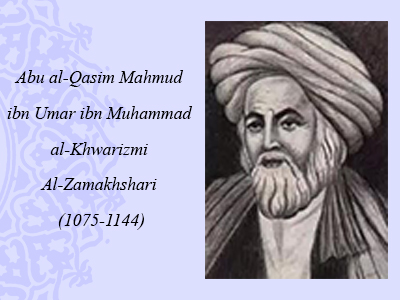



Attraction

Recreation

It is pertinent to note the fact that this oasis was better known as a birthplace of eminent scientists - encyclopedists as Muhammad Musa al-Khwarizmi, Abu Rayhan al-Biruni, Abu Abdullah al-Khwarizmi, Ibn Miskavejh, Abu Nasr al-Iraq, Abu Sahl al-Masihi, Abu Khair ibn al-Hammar, Abu al-Fath al-Mutarrizi and others.
Information about the life and work of al-Zamakhshari was stated partly in his writings, as well as in studies of a number of luminaries of medieval sciences, his close disciples and followers. Among them - Ibn Khallikan, Ibn al-Anbari, Yaqut al-Hamawi, Muhammad al-Yafiyiy, Ibn al-Jawzi, Djalaliddin al-Suyuti, Ibn al-Kifti and others.
According to their testimony, al-Zamakhshari's father was a man of God-fearing, righteous, educated, literate and enjoyed great respect and prestige among the villagers. This allowed him to be appointed as imam of one of the mosques in Zamakhshar. His mother was also a pious, enlightened and wise. Thanks to this young Mahmoud received his primary education fr om his parents. Striving to improve and deepen his knowledge he went to Bukhara where was the center of science and education with a great reputation in the Islamic world. However, in the way an accident happened to him: he fell down from his horse and hurt himself badly. Cold and frost did not spare him. His leg was amputated. Later in life he went on a wooden prosthesis. Despite the fact that his father urged him to learn the craft of tailoring, but he went to the capital city of Khorezm - Gurgandzh (Gurganch, Jurjan, Urgench), wh ere thanks to good handwriting - calligraphy, he found a job for earning.
In search of knowledge al-Zamakhshari visited Khurasan, Syria, Iraq, Hejaz, wh ere he met with prominent scientists of his time, and attended with them in scientific discussions and established research contacts.
Continuing his education, al-Zamakhshari studied various popular social sciences, especially theology, the science of Hadith (prophetic traditions), fiqh (jurisprudence), tafsir (interpretation of the Qur'an), and others. He paid particular attention to the study of Arabic language and literature, the various dialects of the Arabs, their customs and traditions. Perfectly mastering the language of the Holy Quran, he wrote all his works, including on grammar and linguistics in Arabic. Among the latter, in particular, "Mukaddimatu al-Adab" (Introduction to Literature), "Asos al-Balagha" (Fundamentals of achieving perfection), "al-fi al-mufassal Nahw" (Details on grammar) and a short version of "Al unmuzadzh fi al-Nahw "(sample on grammar). Arabs’ recognition indicates the importance of his works in learning the native language for Arabs and that they expressed the recognition without criticism: "If not ... al-Zamakhshari, the Arabs would not know the full depth of their native language."
It is not exaggeration to say via one word that our ancestor was one of the founders of Arabic linguistics, the new method of description of Arabic grammar, compilation of Arabic dictionaries by alphabetical principle of words roots, the first author of multilingual dictionary (Arabic-Persian, Arabic-Persian-Turkish). Thanks to the work and activities of al-Zamakhshari, Mawarannahr became one of the most influential centers of the Arabic language and Arabic-speaking culture.
Scientist visited the Holy Mecca twice. The first time he stayed there for two years, the second time - three. Emir of the city Abu Ali al-Husain ibn Isa ibn Hamzah ibn al-Husayni Vahhas who got more fame for his love of science and poetry, met Zamakhshari with full honors showing high respect. By his command the house was built near the Kaaba for al-Zamakhshari, and all the conditions for scientific, creative and teaching activities were created.
In this connection it is worth to cite the address of the President of the Republic of Uzbekistan Islam Karimov at the celebrations on the occasion of 2500 - anniversary of the city of Khiva:
"Emir of the Holy Mecca Ibn Wahhas admiring the genius of another our great ancestor, who lived in the XII century and created an entirely Arabic grammar, wrote: "All the world's population can be given only one Zamakhshary in Khorezm. Because the village has given the world such a scholar, Mahmoud al-Zamakhshari. Such a person may be born in the world once in a millennium" (Islam Karimov. On the way of security and sustainable development. Volume 6, 358 p.).
When he was in Mecca he wrote a book on the geography of the Arabian Peninsula, and called it "al-Kitab wa al-Jibal amkina wa al-miyah" (Book on mountains, places and waters). The work contains valuable information obtained from the head of the Holy Mecca Ibn Vahhasa, and his own research and observations. In 1856 it was translated into Latin first in Leiden and repeatedly reissued in Europe.
The book of al-Zamakhshari "Al Faik fi Gharib al-Hadith" (Excellent book about the amazing hadiths) is of particular significance which is dedicated to the prophetic traditions. It is distinguished by its rich content and truthfulness of hadiths contained in it. The work has been repeatedly rewritten and published in Hyderabad, Baghdad and Cairo.
Totally Mahmud al-Zamakhshari wrote more than 60 books on linguistics, lexicography, literature, geography, Muslim exegesis (science on the interpretation of the Qur’an), Sunnah, Fiqh and philosophy. Among the preserved about 40 of his works have literary and grammatical-lexicographical character. His commentary on the Qur'an "al-Kashshaf an hakaik al-Tanzim" (Opening the truth of the revelation) recognized as one of the canonical interpretations of the Koran and used in the educational process at the University of al-Azhar University, is considered, in fact, the first example of scientific and critical study of the sacred text scriptures, because attention was paid to the philological analysis in it.
Jahon Information Agency
jahonnews.uz